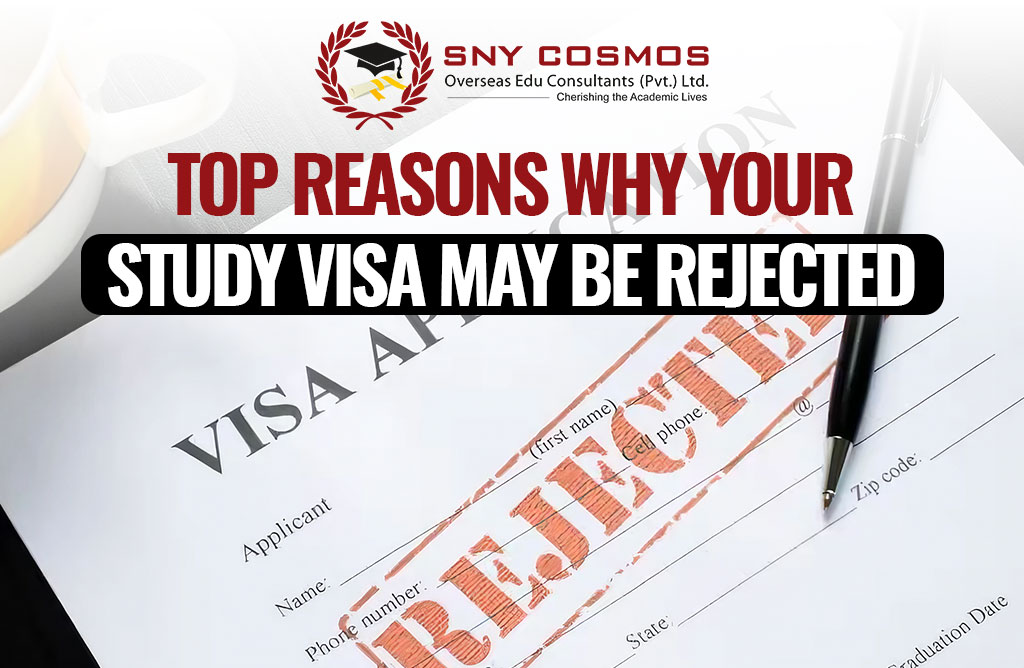Understanding the Top Reasons for Student Visa Rejections

Obtaining a student visa is a crucial step for many international students aiming to pursue higher education abroad. However, despite their aspirations and preparations, a significant number of applicants face rejections. Understanding the reasons behind these denials can help future applicants better prepare and enhance their chances of success. This essay will explore the primary reasons why student visa applications are rejected, including insufficient financial support, lack of strong ties to the home country, inadequate documentation, poor academic performance, and inconsistencies in the application.
Insufficient Financial Support
One of the main reasons for student visa rejections is insufficient financial support. Immigration authorities need assurance that applicants can sustain themselves financially during their stay abroad. This includes covering tuition fees, living expenses, travel costs, and incidental expenses without relying on unauthorized employment or facing financial distress. Applicants must provide comprehensive and verifiable proof of funds, such as bank statements, sponsorship letters, and scholarship awards. Any indication of unreliable or sudden large deposits can raise suspicions. Additionally, the financial stability of sponsors is scrutinized to ensure they can genuinely support the applicant throughout their studies. Failure to convincingly demonstrate financial sufficiency for the entire course duration can lead to visa denial, emphasizing the importance of meticulous financial planning and documentation in the application process.
- Proof of Funds: Applicants must provide detailed proof of their financial status, including bank statements, sponsorship letters, scholarships, and other financial documents. If the evidence provided is inadequate or appears unreliable, the visa may be rejected. For example, sudden large deposits in bank accounts or insufficient documentation to support the source of funds can raise red flags.
- Economic Stability of Sponsors: The financial stability of the sponsors is also scrutinized. Sponsors should have a steady income and the capacity to support the applicant without compromising their own financial responsibilities. If the consular officer doubts the sponsor's ability to maintain support, the visa might be denied.
- Coverage for Entire Duration: Students must demonstrate they have access to funds for the entire duration of their course. Inability to show financial stability for the entire period can lead to rejection. This includes considering inflation and unforeseen circumstances that might affect their financial situation.

Lack of Strong Ties to Home Country
Another significant reason for study visa rejections is the lack of strong ties to the home country. Immigration authorities seek assurance that applicants will return home after completing their studies. To demonstrate such ties, applicants must provide evidence of substantial family connections, such as dependents or close family members residing in their home country. Additionally, ownership of property or significant financial commitments, such as a mortgage or business investments, can illustrate a vested interest in returning. Career prospects in the home country, like job offers or a clear career path requiring the skills gained from the foreign education, also play a crucial role. Insufficient proof of these ties may lead to suspicions that the applicant intends to overstay their visa, resulting in rejection. Therefore, providing concrete evidence of strong personal, financial, and professional connections to the home country is essential for a successful visa application.
- Family Ties: Strong family connections in the home country can be a compelling reason for students to return. Applicants who do not present sufficient evidence of family ties might be suspected of having intentions to overstay.
- Property and Assets: Ownership of property or significant assets in the home country can also demonstrate strong ties. Applicants who cannot show any form of property ownership or long-term financial commitments in their home country might face difficulties.
- Career Prospects: Future career opportunities and job offers in the home country can also indicate strong ties. Visa officers look for signs that the applicant has clear plans to use their education in their home country, including a job offer or a career path that necessitates returning home.
Inadequate Documentation
Inadequate documentation is a common cause for study visa rejections, as immigration authorities rely heavily on thorough and accurate paperwork to assess an applicant's eligibility and intentions. Missing, incomplete, or inconsistent documents can immediately cast doubt on the authenticity and reliability of the application. Key documents include correctly filled application forms, certified academic transcripts, diplomas, language proficiency test scores, and proof of financial stability. Additionally, any discrepancies between the information provided in these documents and the statements made during the visa interview can lead to rejection. Inconsistent or unauthenticated documents, such as unverified bank statements or missing letters of sponsorship, further undermine the credibility of the application. Therefore, ensuring all documentation is complete, accurate, and consistent is crucial for a successful student visa application, as it provides a clear and trustworthy representation of the applicant’s qualifications and intentions.

- Accurate and Complete Forms: All application forms must be filled out accurately and completely. Any discrepancies or omissions can lead to doubts about the applicant's intentions and credibility.
- Educational Credentials: Applicants must provide certified copies of their academic transcripts, diplomas, and degrees. Failure to provide these documents or present unauthenticated copies can result in rejection.
- Language Proficiency: Many countries require proof of language proficiency through standardized tests like TOEFL or IELTS. Inadequate scores or failure to submit these test results can lead to a denial of the visa.
- Visa Interview: The interview is a crucial part of the process. Inconsistent answers or inability to provide satisfactory explanations during the interview can lead to rejection. Applicants must prepare thoroughly and ensure that their verbal responses align with the documentation provided.
Poor Academic Performance
Poor academic performance is a notable factor in study visa rejections, as immigration authorities seek to ensure that applicants are genuine students capable of succeeding in their chosen academic programs. Consular officers meticulously review an applicant’s academic history to gauge their ability to handle the rigors of higher education abroad. Consistently low grades, a history of dropping out, or an overall weak academic record can signal a lack of seriousness or preparedness, raising doubts about the applicant's capacity to complete their studies. Additionally, the relevance of the chosen course to the applicant's previous education and future career goals is scrutinized. If the course appears unrelated to their background or if the applicant fails to convincingly articulate their motivation and goals, the visa may be denied. Thus, demonstrating a strong academic track record and a clear, purposeful educational trajectory is essential for a successful visa application.
- Academic History: Consular officers review the applicant's academic history to assess their suitability for the chosen course. Consistently low grades or a history of dropping out of previous courses can negatively impact the application.
- Relevance of Course: The chosen course should align with the applicant's previous education and career goals. If the course appears irrelevant to the applicant’s background or future plans, it may raise suspicions about their true intentions.
- Motivation and Goals: Applicants should clearly articulate their motivation for studying the chosen course and how it fits into their career aspirations. Vague or unconvincing reasons can lead to rejection.

Inconsistencies in the Application
Inconsistencies in the application are a significant reason for study visa rejections, as they undermine the credibility and reliability of the applicant's intentions. Immigration authorities scrutinize every detail provided, from personal information and academic records to financial documentation and interview responses. Any discrepancies, such as mismatched names, conflicting dates of birth, or differing addresses, can raise immediate red flags. Furthermore, inconsistencies between the statements made during the visa interview and the information presented in the application and supporting documents can lead to suspicions of dishonesty or fraudulent intent. Even minor errors can be perceived as attempts to deceive or conceal important facts. Therefore, ensuring that all information is accurate, consistent, and meticulously verified across all submitted materials is crucial for avoiding visa rejection and demonstrating the applicant’s integrity and genuine purpose for studying abroad.
- Discrepancies in Information: All information provided in the application must be consistent. Discrepancies between the information in the application form, the supporting documents, and the statements made during the interview can raise doubts about the applicant's honesty and intentions.
- Mismatched Details: Mismatched details such as different names, dates of birth, or addresses in various documents can create confusion and suspicion. Applicants must ensure that all documents are accurate and match the information provided in the application form.
- False Information: Providing false or misleading information is a serious offense and can lead to visa rejection and a ban on future applications. It is crucial to be honest and transparent throughout the application process.
Conclusion
The process of applying for a student visa is complex and requires careful attention to detail. Understanding the primary reasons for visa rejections can help applicants avoid common pitfalls and improve their chances of success. Insufficient financial support, lack of strong ties to the home country, inadequate documentation, poor academic performance, and inconsistencies in the application are among the top reasons for rejection. By addressing these areas diligently and presenting a well-prepared, honest application, prospective students can enhance their likelihood of obtaining a student visa and fulfilling their academic aspirations abroad. Overseas education consultants near me, best study abroad consultants, and experts specializing in Masters in Europe for Indian students or Masters in France for Indian students can provide invaluable guidance to navigate this intricate process effectively.

Frequently Asked Questions
1. What should I do if my student visa application is rejected?
If your student visa application is rejected, you should carefully review the rejection letter to understand the reasons provided by the immigration authorities. You may have the option to appeal the decision or reapply, depending on the specific policies of the country you applied to. Consulting with an immigration lawyer or experienced visa consultant can provide guidance on your next steps.
2. How can I prove strong ties to my home country?
Strong ties to your home country can be demonstrated through various means, such as family connections (dependents, immediate family residing there), property ownership, financial commitments (mortgage, business investments), and career prospects (job offers, clear career path requiring skills gained from foreign education). Providing documented evidence of these ties is crucial to convince visa officers of your intention to return home after completing your studies.
3. What financial documents do I need to submit with my visa application?
You typically need to submit comprehensive and verifiable proof of financial support, including bank statements showing adequate funds to cover tuition fees, living expenses, travel costs, and incidental expenses for the entire duration of your course. This may also include sponsorship letters, scholarship awards, and evidence of the financial stability of your sponsors.
4. How important is my academic performance in securing a student visa?
Your academic performance plays a significant role in visa decisions, as it demonstrates your capability to succeed academically in your chosen program. Consular officers may review your academic history, including grades, transcripts, and the relevance of your chosen course to your previous education and future career goals. Demonstrating a strong academic track record and a clear educational trajectory can strengthen your visa application.
5. What are some common mistakes to avoid in my visa application?
Common mistakes to avoid include incomplete or inaccurate documentation, inconsistencies between your application and supporting documents, providing false information, and failing to adequately demonstrate ties to your home country. It's essential to carefully review all requirements, fill out forms accurately, and ensure that all information provided is consistent and truthful throughout the application process.

